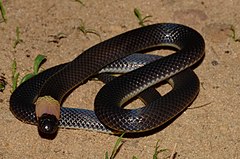Polemon
| Polemon[1] | |||
| Jan, 1858[2] | |||
 | |||
| Systematyka | |||
| Domena | |||
|---|---|---|---|
| Królestwo | |||
| Typ | |||
| Podtyp | |||
| Gromada | |||
| Podgromada | |||
| Rząd | |||
| Podrząd | |||
| Infrarząd | |||
| Nadrodzina | Colubroidea | ||
| Rodzina | |||
| Podrodzina | aparalakty | ||
| Rodzaj | Polemon | ||
| Synonimy | |||
| Gatunki | |||
| |||
Polemon – rodzaj węża z podrodziny aparalakt (Aparallactinae) w rodzinie Lamprophiidae.
Zasięg występowania
Rodzaj obejmuje gatunki występujące w Mali, Gwinei, Sierra Leone, Liberii, Wybrzeżu Kości Słoniowej, Burkina Faso, Ghanie, Togo, Nigerii, Kamerunie, Gwinei Równikowej, Republice Środkowoafrykańskiej, Sudanie Południowym, Gabonie, Kongu, Demokratycznej Republice Konga, Ugandzie, Kenii, Rwandzie, Burundi, Tanzanii, Zambii, Malawi, Angoli[8].
Systematyka
Etymologia
- Polemon: gr. πολεμος polemos „bitwa, wojna, walka”[9].
- Microsoma: gr. μικρος mikros „mały”[10]; σωμα sōma, σωματος sōmatos „ciało”[11]. Gatunek typowy: Microsoma neuwiedi Jan, 1858.
- Miodon: gr. μειων meiōn „mniejszy”; οδους odous, οδοντος odontos „ząb”[3]. Gatunek typowy: Elapomorphus gabonensis A.M.C. Duméril, 1856.
- Urobelus: gr. ουρα oura „ogon”[12]; βελος belos „strzała”[13]. Gatunek typowy: Urobelus acanthias Reinhardt, 1860.
- Cynodontophis: gr. κυων kuōn, κυνος kunos „pies”[14]; οδους odous, οδοντος odontos „ząb”[15]; οφις ophis, οφεως opheōs „wąż”[16]. Gatunek typowy: Cynodontophis aemulans Werner, 1902 (= Microsoma notatum Peters, 1882).
- Elapocalamus: gr. ελοψ elops, ελοπος elopos „niemy”, tu w znaczeniu „jakiś rodzaj węża”[17]; καλαμος kalamos „trzcina”[18]. Gatunek typowy: Elapocalamus gracilis Boulenger, 1911.
- Melanocalamus: gr. μελας melas, μελανος melanos „czarny”[19]; καλαμος kalamos „trzcina”[18]. Gatunek typowy: Melanocalamus leopoldi de Witte, 1941 (= Miodon christyi Boulenger, 1903).
Podział systematyczny
Do rodzaju należą następujące gatunki[8]:
- Polemon acanthias
- Polemon ater[20]
- Polemon barthii
- Polemon bocourti
- Polemon christyi
- Polemon collaris
- Polemon fulvicollis
- Polemon gabonensis
- Polemon gracilis
- Polemon graueri
- Polemon griseiceps
- Polemon newiedi
- Polemon notatus
- Polemon robustus
Przypisy
- ↑ Polemon, [w:] Integrated Taxonomic Information System [online] (ang.).
- ↑ a b G. Jan. Plan d’une Iconographie descriptive des Ophidiens, et description sommaire de nouvelles espèces des Serpents. „Revue et Magasin de Zoologie pure et Appliquée”. 2e Série. 10, s. 516, 520, 1858 (fr.).
- ↑ a b A.M.C. Duméril. Reptiles de la cote occidentale d’Afrique. „Archives du Muséum d’Histoire Naturelle”. 10, s. 206, 1858–1861 (fr.).
- ↑ J.T. Reinhardt. Herpetologiske Middelelser. II. Beskrivelser af nogle nye til Calamariernes Familie henhörende Slänger. „Videnskabelige meddelelser fra den Naturhistoriske forening i Kjöbenhavn”. Aaret 1860, s. 229, 1860 (duń.).
- ↑ F. Werner. Ueber westafrikanische Reptilien. „Verhandlungen der Kaiserlich-Königlichen Zoologisch-Botanischen Gesellschaft in Wien”. 52, s. 345, 1902 (niem.).
- ↑ G.A. Boulenger. Descriptions of three new snakes discovered by Mr. G. L. Bates in South Cameroon. „The Annals and Magazine of Natural History”. Eighth Series. 8, s. 371, 1911 (ang.).
- ↑ G.-F. de Witte: Batraciens et Reptiles. Exploration du Parc National Albert. Mission G. F. de Witte (1933-1935). Brussels: 1941, s. 216. (fr.)
- ↑ a b P. Uetz & J. Hallermann: Genus: Polemon (ang.). The Reptile Database. [dostęp 2019-06-23].
- ↑ Jaeger 1944 ↓, s. 181.
- ↑ Jaeger 1944 ↓, s. 136.
- ↑ Jaeger 1944 ↓, s. 215.
- ↑ Jaeger 1944 ↓, s. 247.
- ↑ Jaeger 1944 ↓, s. 30.
- ↑ Jaeger 1944 ↓, s. 66.
- ↑ Jaeger 1944 ↓, s. 151.
- ↑ Jaeger 1944 ↓, s. 154.
- ↑ Jaeger 1944 ↓, s. 80.
- ↑ a b Jaeger 1944 ↓, s. 37.
- ↑ Jaeger 1944 ↓, s. 133.
- ↑ D.F. Hughes, Z.T. Nagy, C.R. Tilbury, W.R. Branch, F. Portillo, Ch. Kusamba, W.M. Muninga, M.M. Aristote, M. Behangana & E. Greenbaum. A cryptic new species of Polemon (Squamata: Lamprophiidae, Aparallactinae) from the Miombo woodlands of Central and East Africa. „Copeia”. 107 (1), s. 22–36, 2019. DOI: 10.1643/CH-18-098 (ang.).
Bibliografia
- E.C. Jaeger: Source-book of biological names and terms. Springfield: Charles C. Thomas, 1944, s. 1–256. (ang.)
Media użyte na tej stronie
Autor: (of code) -xfi-, Licencja: CC BY-SA 3.0
The Wikispecies logo created by Zephram Stark based on a concept design by Jeremykemp.

